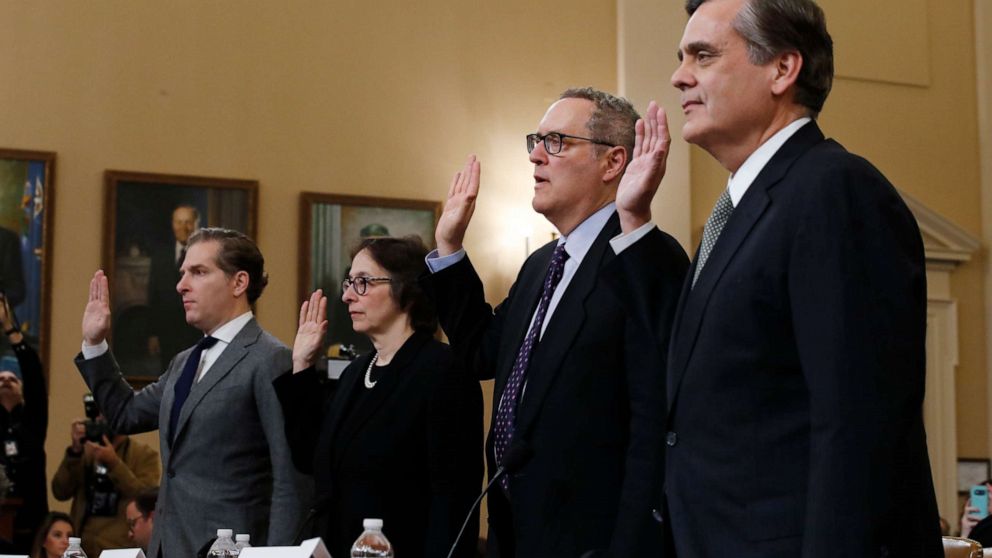Experts at Trump impeachment hearing outline 'serious abuse of power'
The investigation into President Donald Trump entered a historic next phase on Wednesday as the House Judiciary Committee held a hearing on the constitutional grounds for drafting articles of impeachment.
The process of drawing up any articles could begin within days following testimony from legal experts about the evidence of "Treason, Bribery, or other high Crimes and Misdemeanors" the Constitution requires.
Four legal scholars -- Professors Noah Feldman of Harvard Law School, Pamela Karlan of Stanford Law School, Michael Gerhardt of the University of North Carolina School of Law and Jonathan Turley of George Washington University Law School -- each made passionate arguments.
Among the key questions they addressed: Are Trump’s actions the danger the Founders warned about? Is impeachment the remedy they envisioned?
The three law professors called by Democrats -- Feldman, Karlan and Gerhardt -- argued that Trump had committed impeachable offenses while Turley, the constitutional scholar called by Republicans, insisted the threshold had not been met -- at least not yet -- and that Democrats were in a rush to judgment.
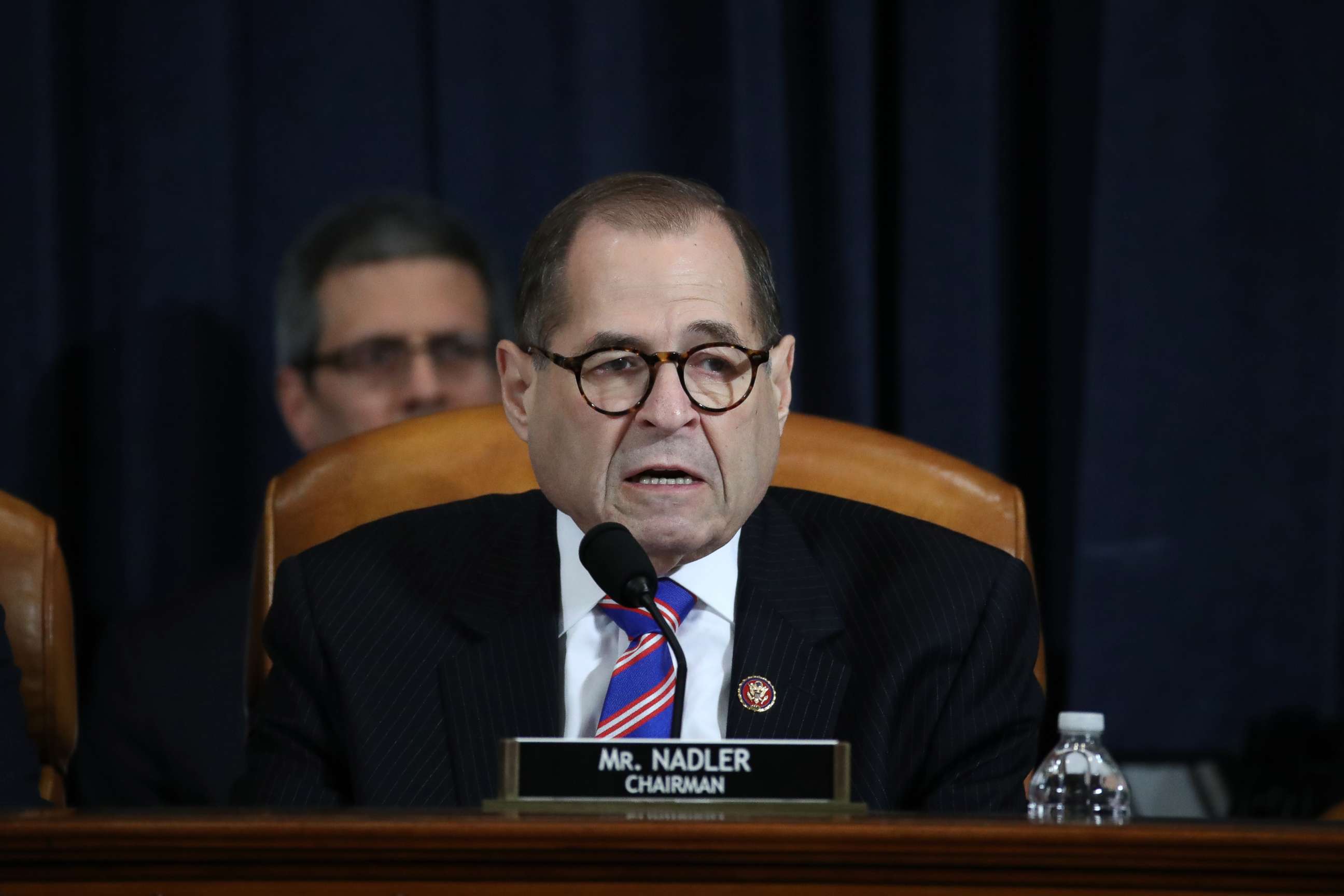
Much of the focus was on the Judiciary Committee's Democratic chairman, Jerry Nadler, who mostly succeeded in controlling Republican objections and maintaining the momentum of the Democrats' impeachment drive.
Here is how the hearing unfolded.
FiveThirtyEight live blogged the hearing as well here -- including analysis from ABC News Political Director Rick Klein and ABC News Deputy Political Director MaryAlice Parks.
6:32 p.m.
Nadler gavels the hearing to a close after almost eight hours of testimony as Republicans continue to raise objections.
6:26 p.m.
Nadler begins his closing statement.
"If President Trump's action's aren't impeachable, nothing is impeachable," Nadler quotes professor Michael Gerhardt as saying.
"All these proceedings have all the protections afforded prior presidents," Nadler says, arguing the Republicans are focusing on process because they cannot make a defense on the facts.
After invoking the Constitution, Nadler says, "I urge my colleagues to stand behind the oath you have taken."
ABC News' reporter Benjamin Siegel reports from the hearing room: After Republicans spent the day using Nadler's words against him, arguing that the current case against President Trump doesn't meet the bar he set to proceed with impeachment in the past, Nadler ended the day by saying his three conditions have been met.
"Let me be clear, all three parts of that test have been met," Nadler said.
"First, yes, the president has committed an impeachable offense. The president asked the foreign government to intervene in our elections, then got caught, then obstructed the investigators twice. Our witnesses told us in no uncertain terms this conduct constitute---constitutes high crimes and misdemeanors, including abuse of power."
"Second, yes, the president's alleged offense represent the direct threat to the constitutional order. Professor Karlan warned, joining a foreign government into our election process is an especially serious abuse of power because it undermines democracy itself. Professor Feldman echoed, if we cannot impeach a president who abuses his office for personal advantage, we no longer live in a democracy, we live in a monarchy or under a dictatorship," Nadler continued.
"President Trump's actions represent the threat to our national security and an urgent threat to the integrity of the next election. Third, yes, we should not proceed unless at least some of the citizens who supported the President in the last election are willing to come with us. A majority of this country is clearly prepared to impeach and remove President Trump.," Nadler said.
6:25 p.m.
Will you let us know where we're going? Ranking Member Doug Collins asks Nadler as the hearing nears a close, demanding more fact witnesses, including House Intelligence Committee Chairman Adam Schiff.
Nadler has said Republicans will have an opportunity to call other witnesses.
5:53 p.m.
Pamela Karlan has just apologized for referencing the president's son, Barron.
"If I can say one thing, I want to apologize for what I said earlier about the president's son. It was wrong of me to do that. I wish the president would apologize for the things he's said wrong, but I do regret having said that."
5:05 p.m.
First lady Melania Trump weighed in on her son Barron's name coming up during the hearing when one of the law professors, Pamela Karlan, made a play on words about his name while making a point that a president can't be treated the same as a king. "While the president can name his son Barron, he can’t make him a baron," she said.
Trump tweeted, "A minor child deserves privacy and should be kept out of politics. Pamela Karlan, you should be ashamed of your very angry and obviously biased public pandering, and using a child to do it."
A few minutes later, a Republican member had the tweet entered into the official hearing record.
4:17 p.m.
As Nadler calls a brief recess with about 20 members left to ask questions, ABC's Anne Flaherty points out some of the key takeaways from the hearing so far.
In her analysis, she writes that one of the biggest threads is that the legal experts brought by Democrats all argue that Trump's behavior is a textbook example of the actions the framers of the Constitution had in mind when they defined impeachment.
The lawyer brought by Republicans had a different argument that Democrats are moving too quickly and could set a dangerous precedent.
3:41 p.m.
ABC News Capitol Hill reporter Sarah Kolinovsky reports that during breaks, members of the Judiciary Committee gave their takes on what they think are the most important points made during the hearing.
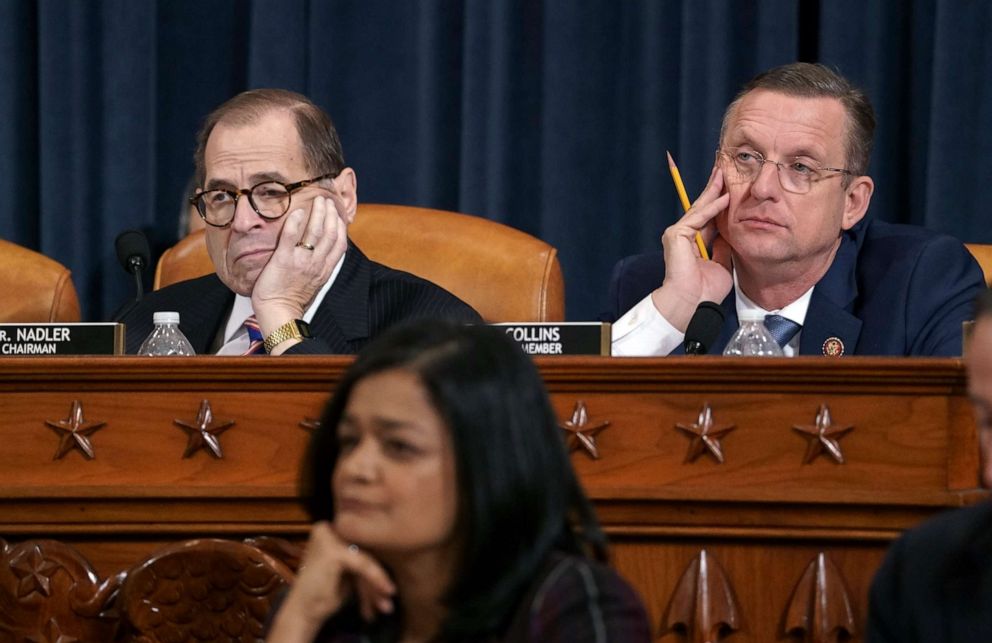
Democrat Rep. Pramila Jayapal highlighted the idea "'when a president obstructs Congress in getting the information that we need to get, that essentially torpedoes the balance of power that is built into the Constitution.' I think that that is a very, very important point, and we should come back to that over and over and over again," she said, pointing to a possible obstruction article of impeachment.
She also underscored the fact that no Republicans have attempted to defend the president's actions -- it's been all process, no substance.
"They tried to talk about the process, how it might be too fast, how this, that, but I think it’s very very compelling that there has not been a defense presented of the actual facts that are on the record," Jayapal said.
The only Republican to speak, Ranking Member Doug Collins, continued to deride the process of the hearing.
"I think the American people frankly are getting lost and I think that’s one of the things we’re going to be looking at going forward in this, but it also brings me back to my question for my chairman, is: 'Why are we simply doing this with no plan to go forward with actual fact witnesses?'”
He added, “I respect all the law professors, they're doing their job as they said they would, but this does not move the needle as far as understanding why we’re in this process to start with."
3:35 p.m.
After the hearing resumed at 2:43 p.m. the president's son Barron came up in one exchange.
When Democratic Rep. Sheila Jackson Lee of Texas asked Karlan, "What comparisons, Professor Karlan, can we make between kings that the framers were afraid of and the president's conduct today? she responded, "So, kings could do no wrong, because the king's word was law. And contrary to what President Trump has said, Article II does not give him the power to do anything he wants. And I’ll just give you one example that shows you the difference between him and a king, which is the Constitution says there can be no titles of nobility. So, while the president can name his son Barron, he can’t make him a baron."
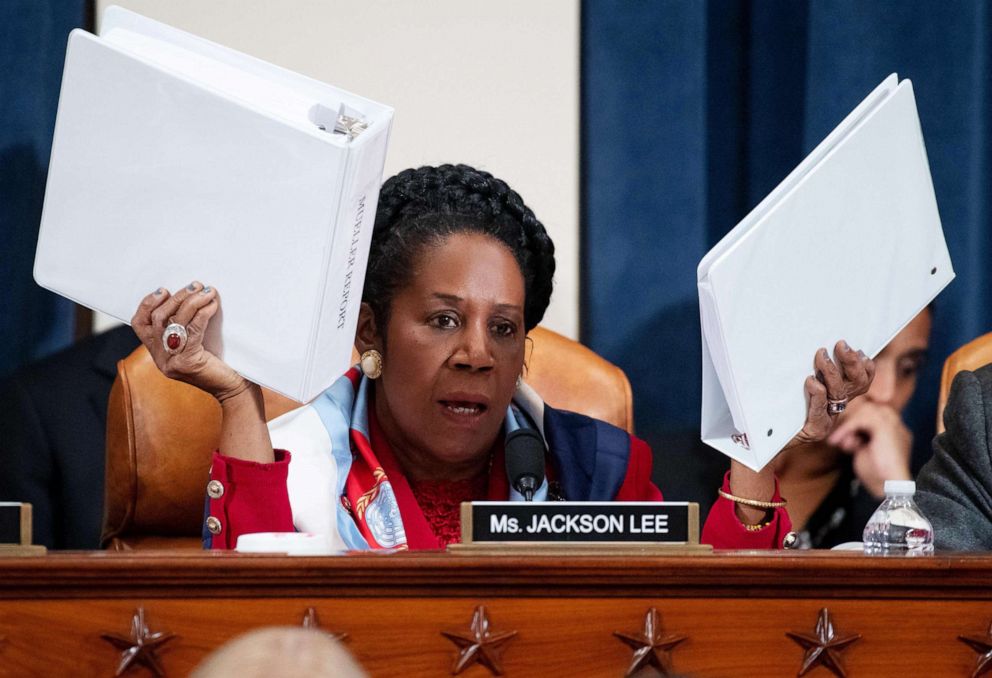
Karlan's comment received some applause in the hearing room, but the White House shot back at 3:12 p.m.
"Classless move by a Democratic “witness”. Prof Karlan uses a teenage boy who has nothing to do with this joke of a hearing (and deserves privacy) as a punchline. And what’s worse, it’s met by laughter in the hearing room. What is being done to this country is no laughing matter," White House press secretary Stephanie Grisham tweeted.
ABC News' Katherine Faulders reports that Republicans later went after Karlan for her comments about Barron Trump. In a contentious back and forth during his five minutes of questioning, Rep. Gaetz said her earlier comments make her look mean and doesn't give her argument credibility.
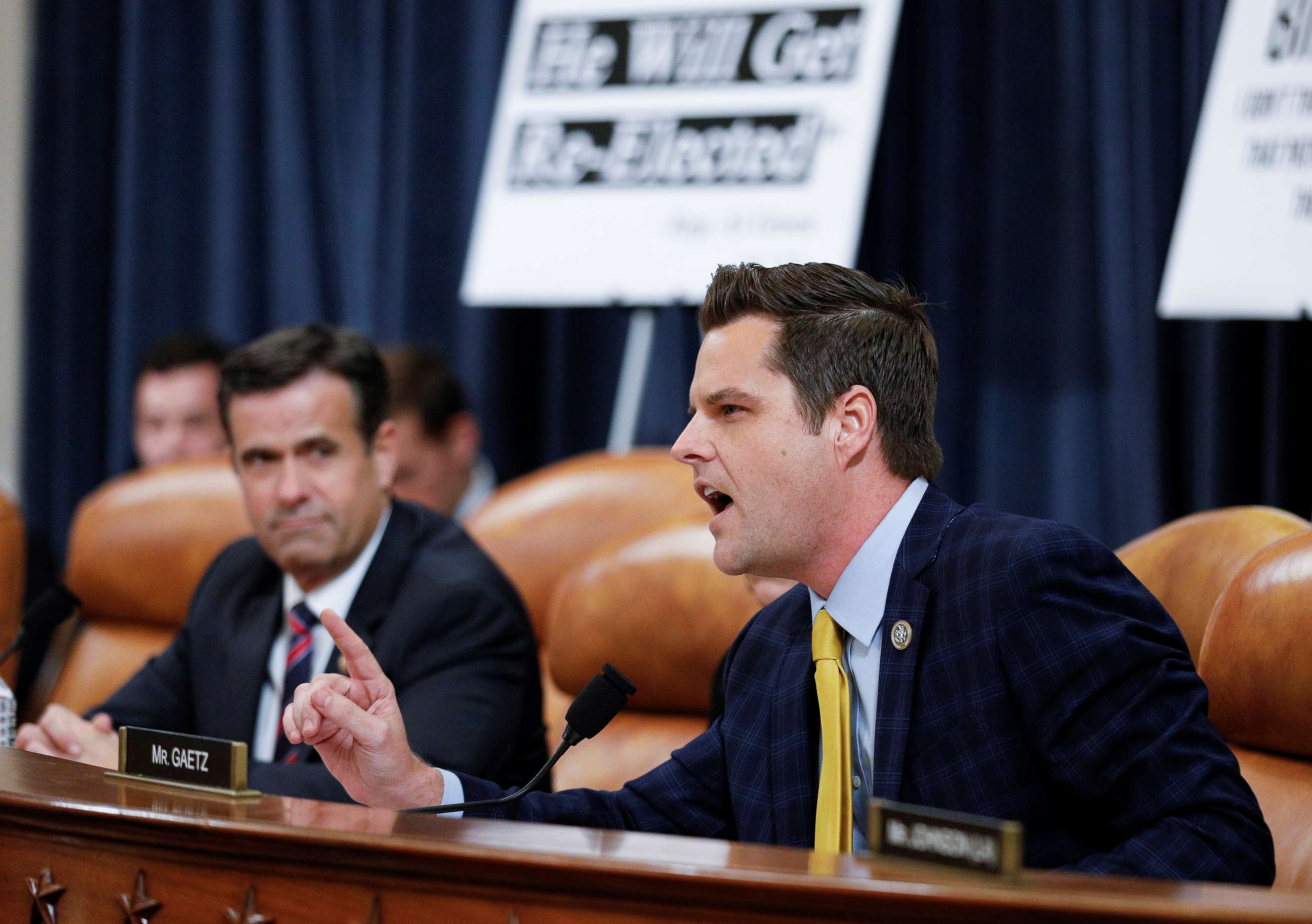
"Now, let me also suggest that when you invoke the president's son's name here, when you try to make a little joke out of referencing Barron Trump, that does not lend credibility to your argument. It makes you look mean. I makes you look like you're attacking someone's family, the minor child of the president of the United States," Gaetz said.
1:31 p.m.
Nadler calls a break for votes.
12:54 p.m.
ABC News' congressional reporter Benjamin Siegel reports from the hearing room: The expert witness picked by Republicans, Jomathan Turley, is also raising questions about the timeline, arguing that Democrats are rushing to impeach Trump prematurely without hearing from all witnesses and allowing the courts to adjudicate disputes over documents and testimony between Congress and the White House.
"If you impeach a president, if you make a high crime and misdemeanor out of going to the courts, it is an abuse of power. It's your abuse of power. You're doing precisely what you are criticizing the president for doing. We have a third branch that deals with conflicts of the other two branches, and what comes out of there, and what you do with it is the very definition of legitimacy," Turley says.
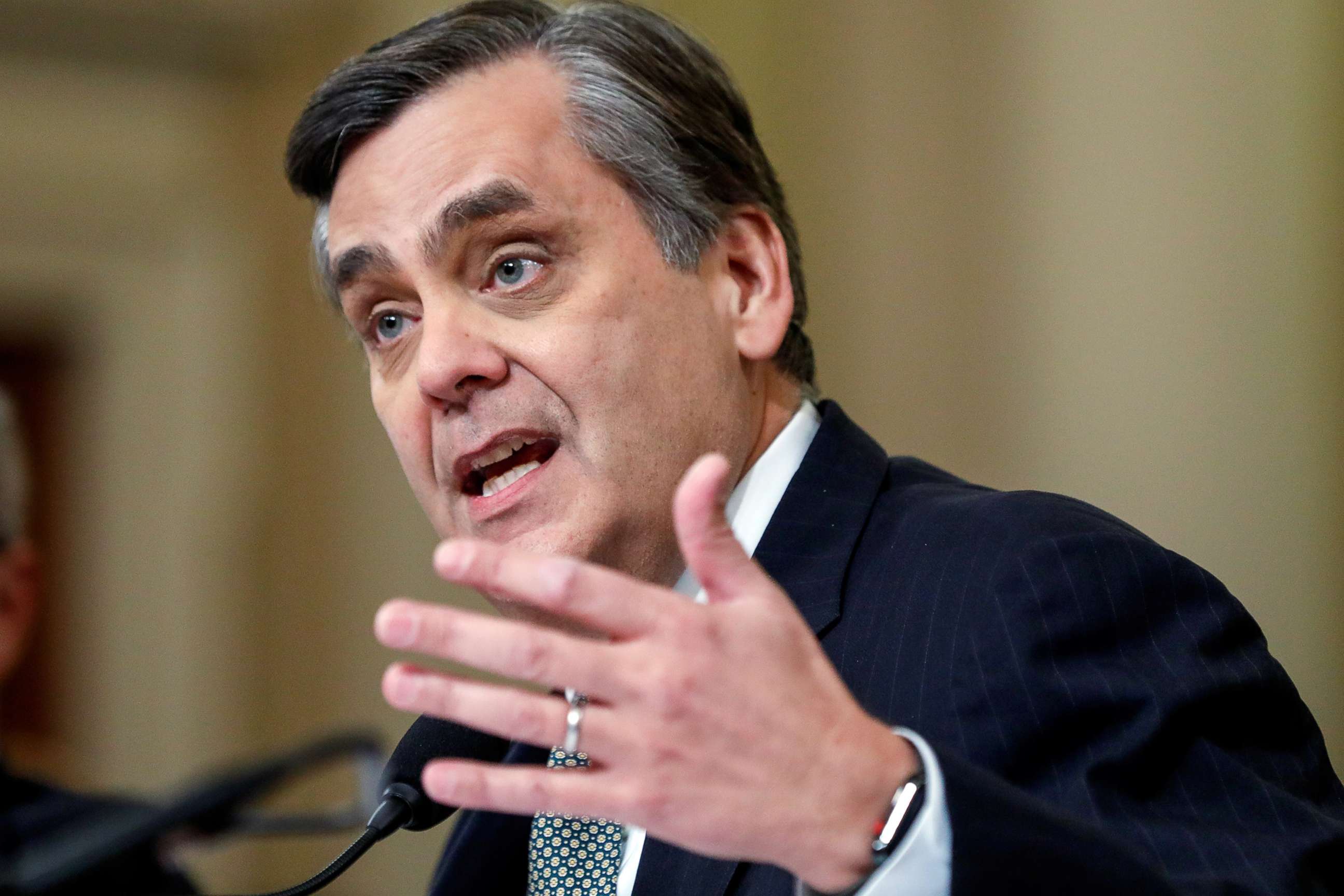
Turley also seemed to question whether Democrats are actually aiming to build a successful impeachment case for a Senate trial. "Fast is not good for impeachment. Narrow, fast impeachments have failed, just ask Johnson," he said. "This is the narrowest impeachment in history."
12:29 p.m.
Nadler gavels the hearing back into session as questioning by the Republican side commences.
The expert witness for the Republicans, Jonathan Turley, makes an extended argument about why impeachment, especially for bribery, isn't warranted based on the evidence.
Turley says bribery is not an overarching concept as House Intelligence Committee Chairman Adam Schiff has cited, saying that while there was no legal definition included in the Constitution, that didn't mean the term didn't have a specific meaning.
He says these crimes have meaning and that bribery has been specifically defined as accepting money or gifts as a head of state or person in public office.
"So I don't think that dog will hunt in the 18th century and I don't think it will hunt today," he says, adding that the Supreme Court has ruled you can't apply a "boundless interpretation" to a crime like bribery. "This isn't improvisational jazz. Close enough is not good enough. If you're going to accuse a president of bribery, you need to make it stick because you're trying to remove a duly elected president,"
Turley also says that the evidence presented so far does not establish the crime of obstruction of justice, saying that he also been a critic of the obstruction article against President Nixon.
He argues that articles of impeachment on obstruction or abuse of power without proof of the alleged underlying alleged crimes weren't warranted. The president's supporter made a similar argument after the Mueller investigation.
Turley maintains that the judicial branch also has a role in deciding disputes between the president and Congress about what information has to be turned over and that an obstruction case is much stronger if Congress can argue the president defies a court order.
"President Trump has gone to the courts, he's allowed to do that. We have three branches, not two," he said, going on to criticize how quickly the Democrats have pursued the impeachment inquiry."It's a perfect storm. You set an incredibly short period, demand a huge amount of information, and when the president goes to court, you then impeach him," he says.
12:27 p.m.
ABC News' Ben Gittleson reports on the president's reaction to the hearing:
"It is the most unfair thing that anybody's ever seen," Trump told reporters during a photo op earlier Wednesday with Italy's prime minister at the NATO summit in London. "They would have done much better if they gave us equal representation, because the public gets it. But just look at today. Now, I don't think too many people are going to watch, because it's going to be boring. Alright? In fact, you're here, I guess you're here and we'll supersede it, right? But not a lot of people are going to be watching today, but just think of this: Constitutional lawyers, they get three, and we get one. What kind of a deal is that? You don't need a constitutional lawyer, because there was nothing done wrong. Zero done wrong."
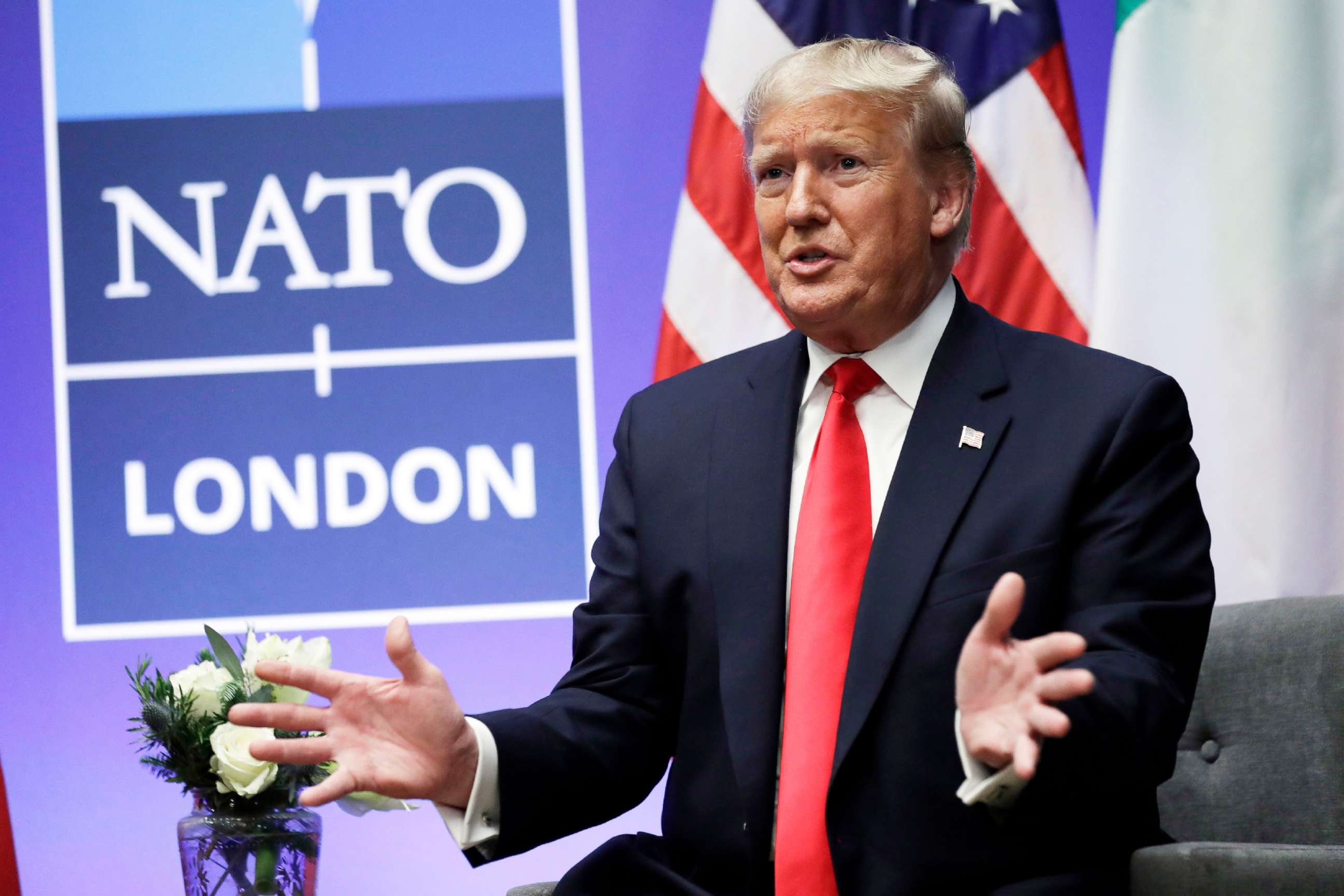
Asked to comment on the House Democrats' impeachment report that came out Tuesday and the hearing today, Trump replied: "It’s a joke, everybody is saying it. And I watched reviews, I watched Hannity, Sean Hannity, I watched Laura Ingram, I watched Tucker Carlson, I watched a lot of other legal scholars, frankly, I watched some people with great legal talent and highly respected -- Alan Dershowitz, and many more, many more."
12:10 p.m.
Chairman Nadler calls a brief break.
12:05 p.m.
Feldman touches on the argument that the president did not commit a crime or impeachable offense because Ukraine ultimately got the military aid without announcing investigations.
“The possibility that the president might get caught in the process of attempting to abuse his office and then not be able to pull it off does not undercut in any way the impeachability of the acts,” he says.
“President Nixon was subject to articles of impeachment preferred by this committee for attempting to cover up the Watergate break-in. The fact that the president was not ultimately successful in covering up the break-in was not grounds for not impeaching him. The attempt itself is the impeachable act,” he says.
Gerhardt adds that every president who has been impeached failed to achieve the goals they set out to achieve, or at least to get away with it.
“One of the things to understand from the history of impeachment is everybody who's impeached has failed. They've failed to get what they wanted. And what they wanted was not just to do what they did, but to get away with it,” he said.
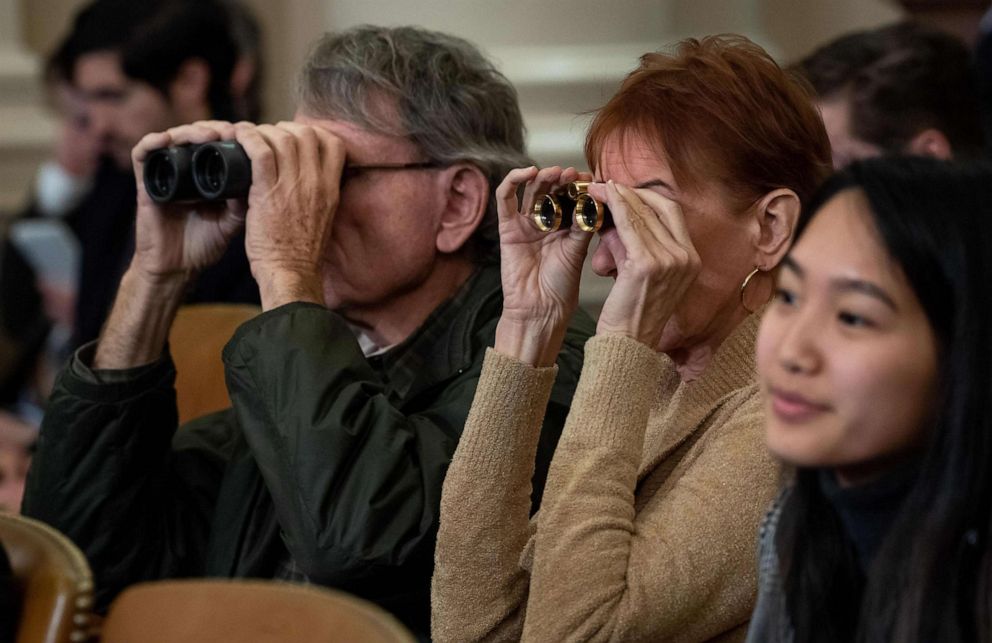
ABC News' Devin Dwyer notes that as we've seen in polling and heard first-hand from voters -- Republican and Democrat -- there is a prevalent view in public opinion that judgment on the president's might be better left to voters in the 2020 election. 'What's the point in all this' - some say - 'especially if Trump won't be removed by the Senate? Just fight it out at the ballot box next year.'
Today, Democrats and the witnesses are attempting to directly answer those skeptics.
"We are all aware that the next election is looming, but we cannot wait for the election to address the present crisis. The integrity of that election is one of the very things at stake," Chairman Nadler said in his opening.
"The president has shown us his pattern of conduct. If we do not act to hold him in check now, President Trump will almost certainly try again to solicit interference in the election for his personal political gain."
Feldman, Karlan and Gerhardt all echoed those points prominently in their testimonies.
Feldman said the historical origins of impeachment were rooted in a fear a president might "corrupt the electoral process and ensure his re-election."
11:52 a.m.
Karlan makes a point about the public testimony of U.S. Ambassador to the European Union Gordon Sondland about what he says he understood Trump wanted from Ukraine's president.
"The most chilling line for me of the entire process is the following: Ambassador Sondland said "he had to announce the investigations," Kalran, the Stanford law professor says. "He's talking about President Zelenskiy. "He had to announce the investigations. He didn't actually have to do them, as I understood it." And then he said "I never heard, Mr. Goldman, anyone say the investigations had to start or had to be completed. The only thing I heard from Mr. Giuliani or otherwise was they had to be announced in some form.
"And what I took that to mean was this was not about whether Vice President Biden actually committed corruption or not. This was about injuring somebody who the president thinks of as a particularly hard opponent."
11:50 a.m.
Karlan says Trump’s actions in regard to Ukraine establish bribery as a “high crime or misdemeanor,” even though that definition can be different from the definition of bribery under criminal law.
She says bribery as it relates to impeachment is based on how it was understood in 18th century common law.
“When you took private benefits or when you asked for private benefits in return for an official act, or someone gave them to you to influence an official act, that was bribery,” she said.
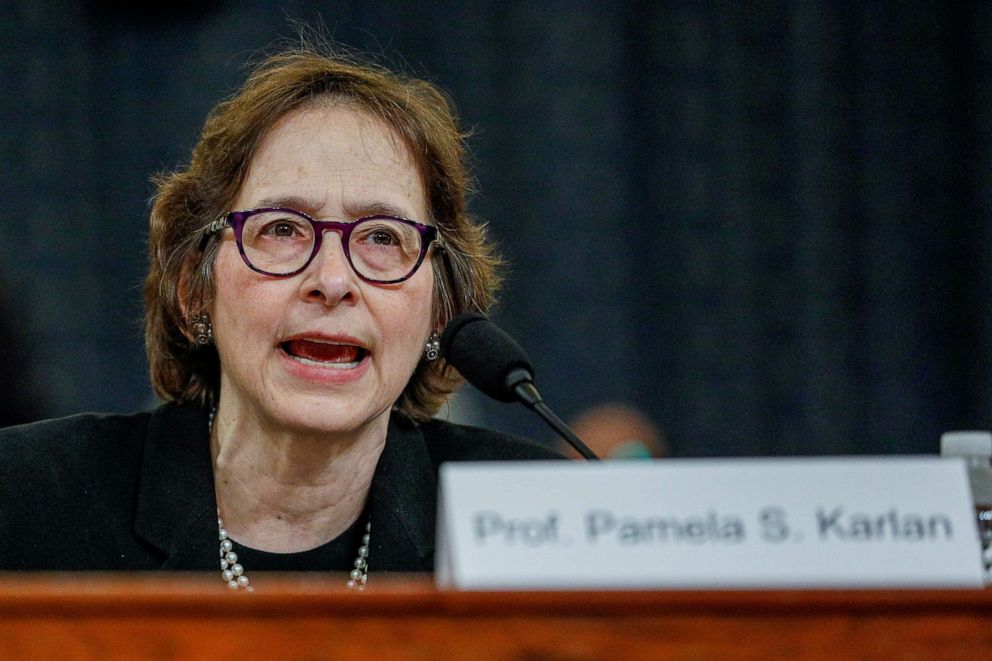
11:47 a.m.
ABC News Senior Congressional Correspondent Mary Bruce notes that Chairman Nadler has dropped a lot of hints about the likely scope of the articles of impeachment this morning, suggesting they could pursue all constitutional grounds.
“Never before has a president engaged in a course of conduct that included all of the acts that most concerned the Framers,” Nadler said.
So far, House Speaker Nancy Pelosi and House Intelligence Committee Chairman Adam Schiff have said Trump’s conduct could constitute bribery but here Nadler is suggesting it also rises to the level of high crimes and misdemeanors.
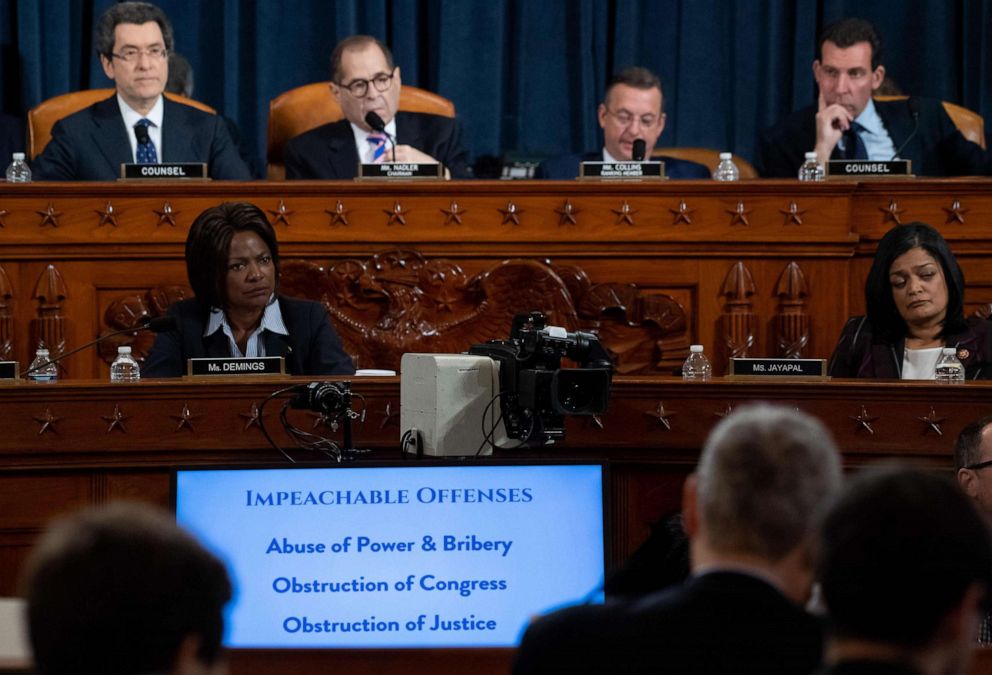
And in his line of questioning now, Democratic Counsel Norm Eisen is suggesting they could pursue articles based on abuse of power and bribery, obstruction of congress and obstruction of justice.
Right off the bat, Eisen asked the witnesses “did President Trump commit impeachable high crime and misdemeanor of abuse of power based on that evidence and those findings?”
Feldman, Karlan and Gephardt all said yes. “We three are unanimous,” Gephardt said.
In his opening statement, Nadler leaned heavily into obstruction, saying “there is precedent for recommending impeachment here,” noting other presidents have been impeached for obstruction.
And Nadler suggested they may broaden the scope to include obstruction of the Mueller probe as well.
11:43 a.m.
ABC News' Katherine Faulders reports from the hearing room that lawyers for the committee are expected to conduct a majority of the questioning in today’s hearing.
The majority counsel Norm Eisen, now questioning the experts, is a former “ethics czar” in the Obama administration and former U.S. ambassador to the Czech Republic. Eisen served as special counsel and special assistant to the president for ethics and government reform in the White House from 2009-2011.
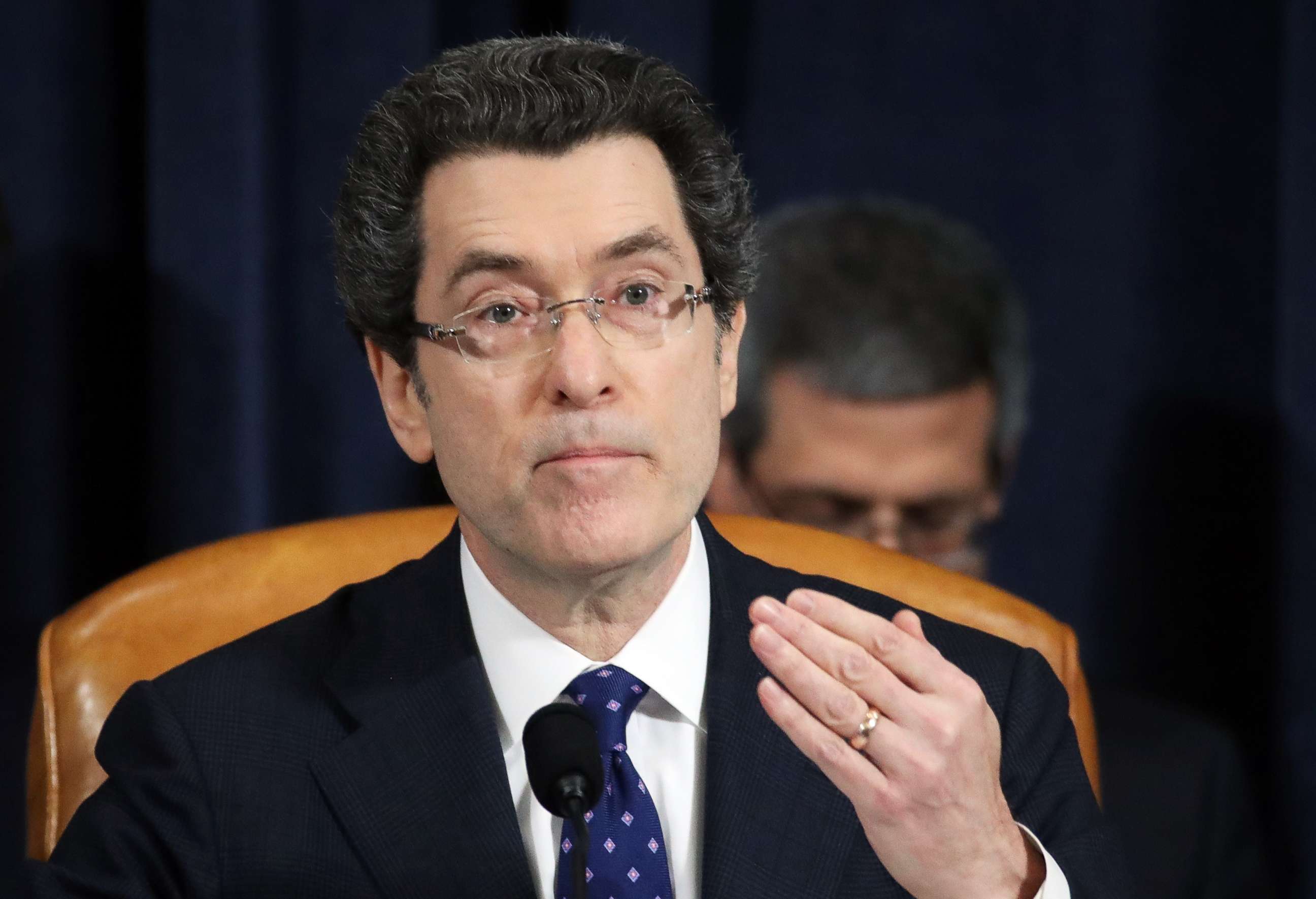
He is the founder of Citizens for Responsibility and Ethics in Washington (CREW) -- a liberal watchdog group that filed the emoluments lawsuit against Trump, claiming he has violated the Constitution by profiting from his business empire while serving in office.
The Republican counsel is Paul Taylor, a veteran committee lawyer who has also worked as an associate at two well-known private law firms, Kirkland & Ellis and Covington & Burling. He graduated from Yale in 1991 and from Harvard law school in 1994.
His official title is Chief Republican Counsel, House Subcommittee on the Constitution, Civil Rights, and Civil Liberties.
11:20 a.m.
The expert witness called by Republicans, George Washington University Law School professor Jonathan Turley, disagrees with the other constitutional scholars.
Turley argues the facts presented by the House Intelligence Committee don't meet the necessary standard for impeachment.
He makes a point to say that he does not support and voted against President Trump and has been critical of his policies, rhetoric, and comments about Hunter Biden.
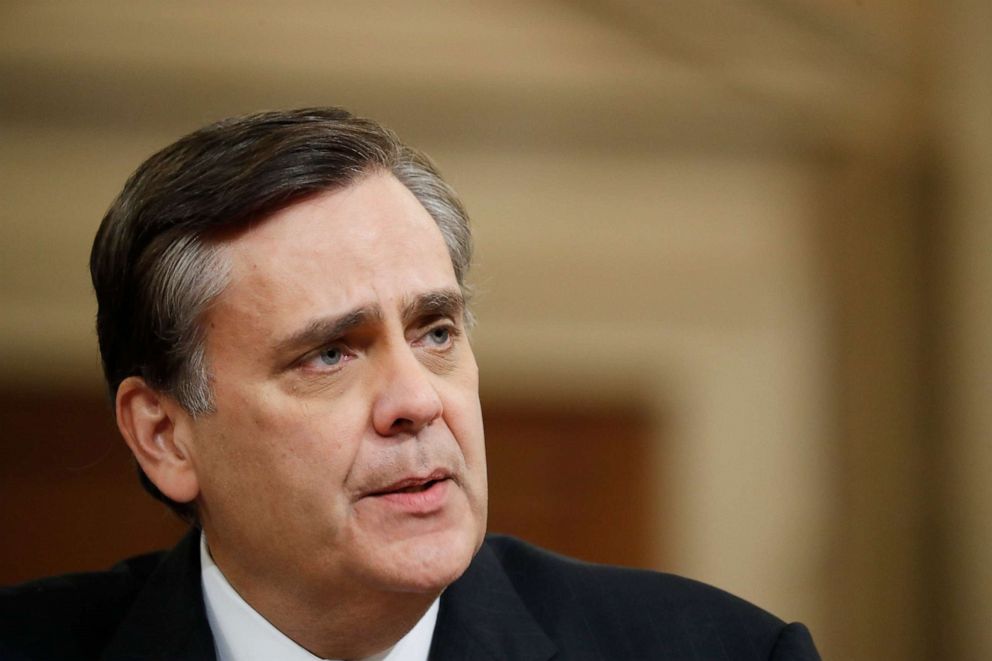
Turley calls the current legal case for impeachment not just “woefully inadequate, but in some respects, dangerous, as the basis for the impeachment of an American president.”
“I am concerned about lowering impeachment standards to fit a paucity of evidence and an abundance of anger. If the House proceeds solely on the Ukrainian allegations, this impeachment would stand out among modern impeachments as the shortest proceeding, with the thinnest evidentiary record, and the narrowest grounds ever used to impeach a president.,” Turley says in his opening statement.
“That does not bode well for future presidents who are working in a country often sharply and, at times, bitterly divided,” he says.
In a lighter moment, he appeals to the political divisions around the country today, asking the committee to look beyond politics and think carefully about this impeachment.
"I get it. You are mad. The President is mad. My Democratic friends are mad. My Republican friends are mad. My wife is mad. My kids are mad. Even my dog is mad . . . and Luna is a golden doodle and they are never mad," he said, asking if an impeachment will "make us all less mad or will it only give an invitation for the madness to follow in every future administration," Turley continues.
"It is not wrong because President Trump is right. His call was anything but “perfect” and his reference to the Bidens was highly inappropriate... No, it is wrong because this is not how an American president should be impeached."
11:05 a.m.
The third law professor called by Democrats, Michael Gerhardt of the University of North Carolina School of law, agrees with Pamela Karlan and Noah Feldman, the previous two witnesses.
"The record compiled this far shows that the president has committed several impeachable offenses, including bribery, abuse of power in soliciting a personal favor from a foreign leader to benefit himself personally, obstructing justice and obstructing Congress," Gerhardt says.
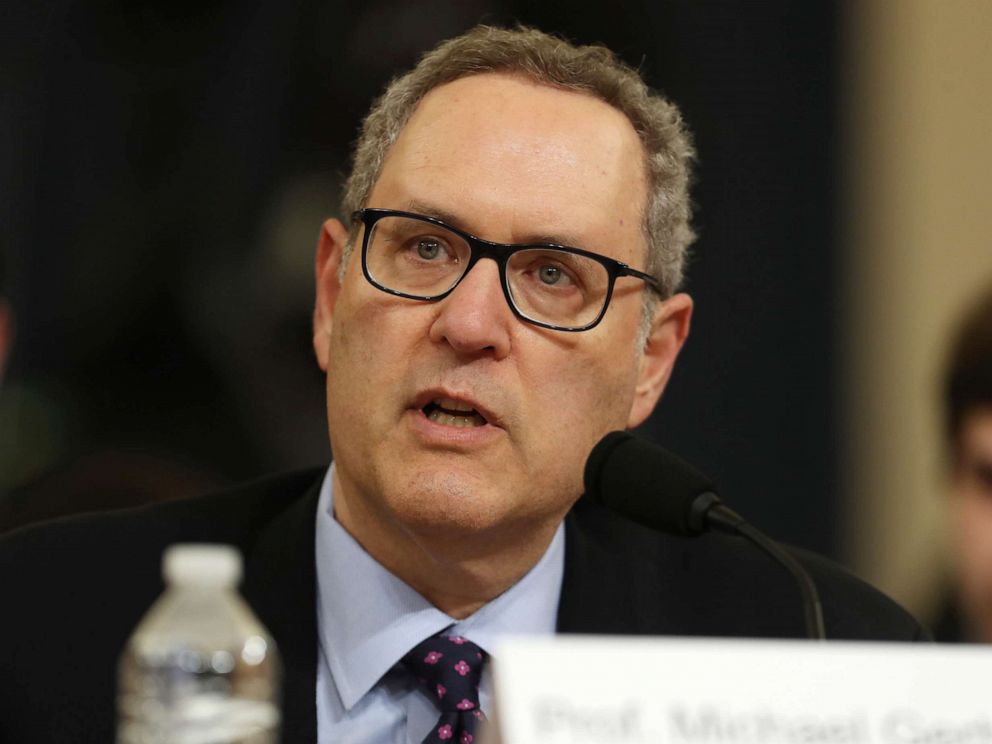
Gerhardt said the context and the gravity of a president's conduct are a big part of whether it fits the definition of "high crimes and misdemeanors" and meets the standard for impeachment.
"Both the context and gravity of the president's conduct are clear," Gerhardt said, citing testimony that the president wanted Ukraine to publicly announce investigations into the Bidens but not that he specifically said he wanted the investigations carried out.
"Because it could then be used in this country to manipulate the public into casting aside his political rival," Gerhardt says.
10:58 a.m.
Stanford law professor Pamela Karlan speaks next -- firing an opening shot at the top Republican on the Judiciary Committee, GOP Rep. Doug Collins, after he suggested in his opening statement that the legal experts hadn't had time to digest the 300-page report released by Democrats on the House Intelligence Committee.
"Mr. Collins, I would like to say to you, sir, that I read transcripts of every one of the witnesses who appeared in the live hearing because I would not speak about these things without reviewing the facts. So, I'm insulted by the suggestion that as a law professor I don't care about those facts, but everything I read on those occasions tells me that when President Trump invited, indeed, demanded foreign involvement in our upcoming election," she says.
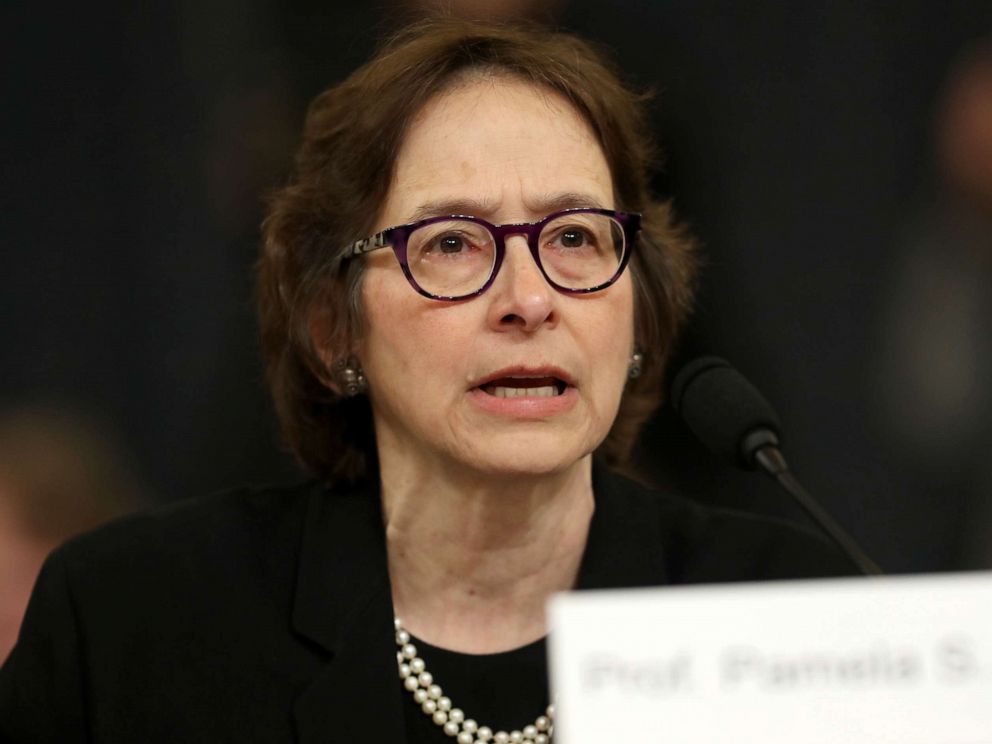
"He struck at the very heart of what makes this a republic to which we pledge allegiance, that demand as Professor Feldman just explained, constituted an abuse of power. I want to explain in my testimony, drawing a foreign government into our elections is an especially serious abuse of power because it undermines democracy itself."
"The very idea that a president might seek the aid of a foreign government in his re-election campaign would have horrified [the Founders], but based on the evidentiary record, that is what President Trump has done," Karlan says.
Karlan said the current case is unprecedented because the president has "doubled down" on his actions to undermine American elections.
“What happened in 2016 was bad enough: there is widespread agreement that Russian operatives intervened to manipulate our political process. But that distortion is magnified if a sitting President abuses the powers of his office actually to invite foreign intervention,” Karlan says.
She compared President Trump’s actions to withhold aid and a White House meeting from Ukraine to if the U.S. government withheld aid from a state impacted by natural disasters.
“Imagine living in a part of Louisiana or Texas that’s prone to devastating hurricanes and flooding. What would you think if, when your governor asked the federal government for the disaster assistance that Congress has provided, the President responded, “‘I would like you to do us a favor.’ I’ll meet with you and send the disaster relief once you brand my opponent a criminal.”?” she says.
“Wouldn’t you know in your gut that such a president had abused his office, betrayed the national interest, and tried to corrupt the electoral process? I believe the evidentiary record shows wrongful acts on that scale here," Karlan says.
10:45 a.m.
Noah Feldman, the Harvard Law School law professor, testifies his analysis is that President Trump’s actions fit the constitutional definition of “high crimes and misdemeanors.”
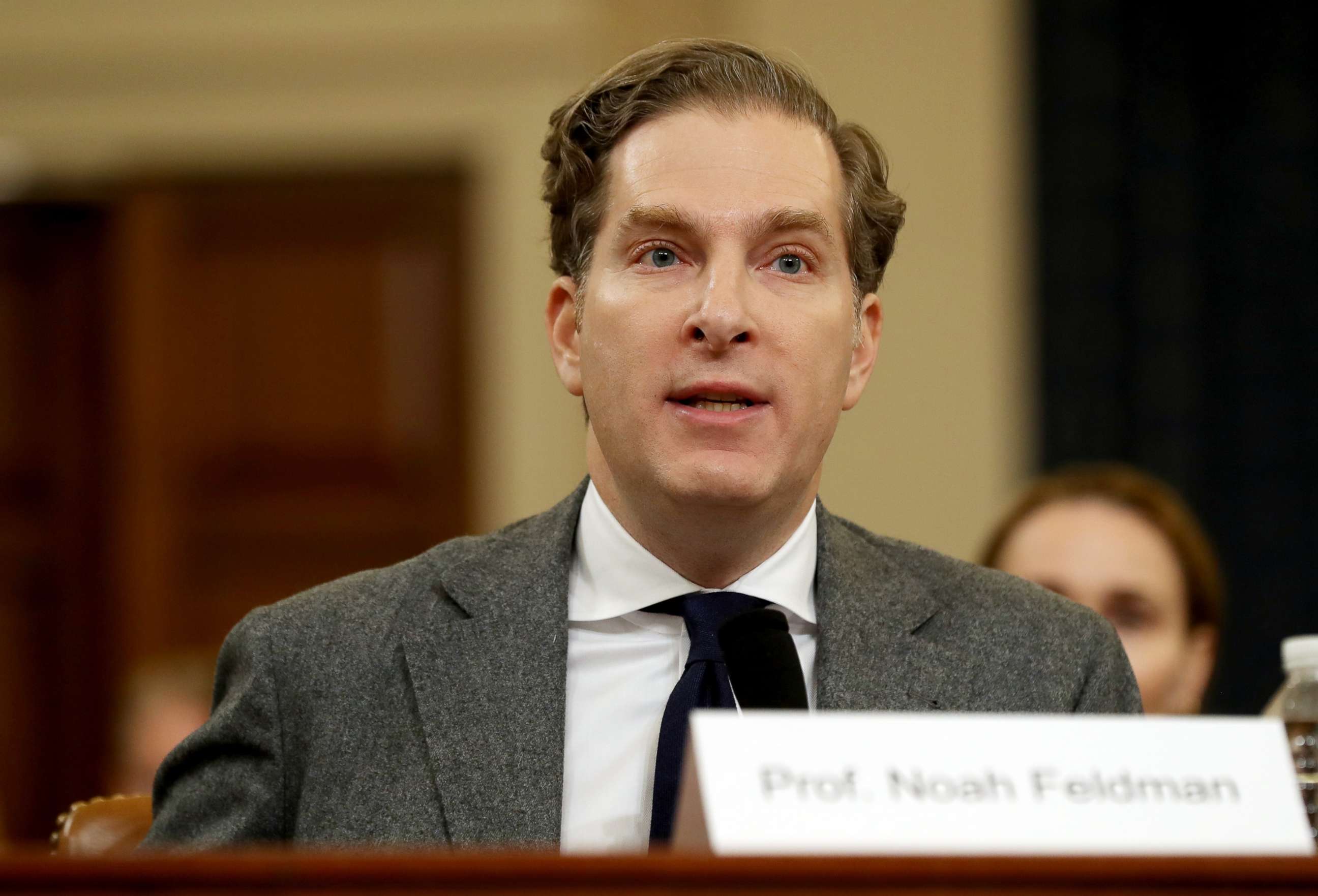
“On the basis of the testimony and evidence before the House, President Trump has committed impeachable high crimes and misdemeanors by corruptly abusing the office of the presidency,” Feldman said, specifically citing Trump's request for Ukrainian President Voldymyr Zelenskiy to pursue investigations into the Bidens and purported Ukraine interference in the 2016 election.
10:32 a.m.
ABC News' congressional reporter Benjamin Siegel reports from the hearing room:
Republicans are already trying to knock Chairman Jerry Nadler off of his game, interjecting multiple times on procedural matters. It won't be the last time they try to use the tools of the minority to air their concerns with what they argue is an unfair process against Trump.
Noteworthy that, on obstruction, Nadler made this comparison to President Bill Clinton's impeachment: "In 1998, President Clinton physically gave his blood. President Trump, by contrast, has refused to produce a single document, and directed every witness not to testify. Those are the facts before us."
Republicans just forced a vote to shelve their request to compel Adam Schiff to testify before the committee. The motion to table passed (24-17) along party lines.
Republicans are afforded this ability under the impeachment inquiry resolution that laid out the parameters of the inquiry. They could, theoretically, continue forcing votes to bring other witnesses (the whistleblower, Hunter Biden, etc.) forward for the rest of the morning.
For now, they have decided to continue pelting Nadler with inquiries about the rules governing the hearing. After a few minutes of back-and-forth, Nadler is trying to get the witnesses to give their opening statements.
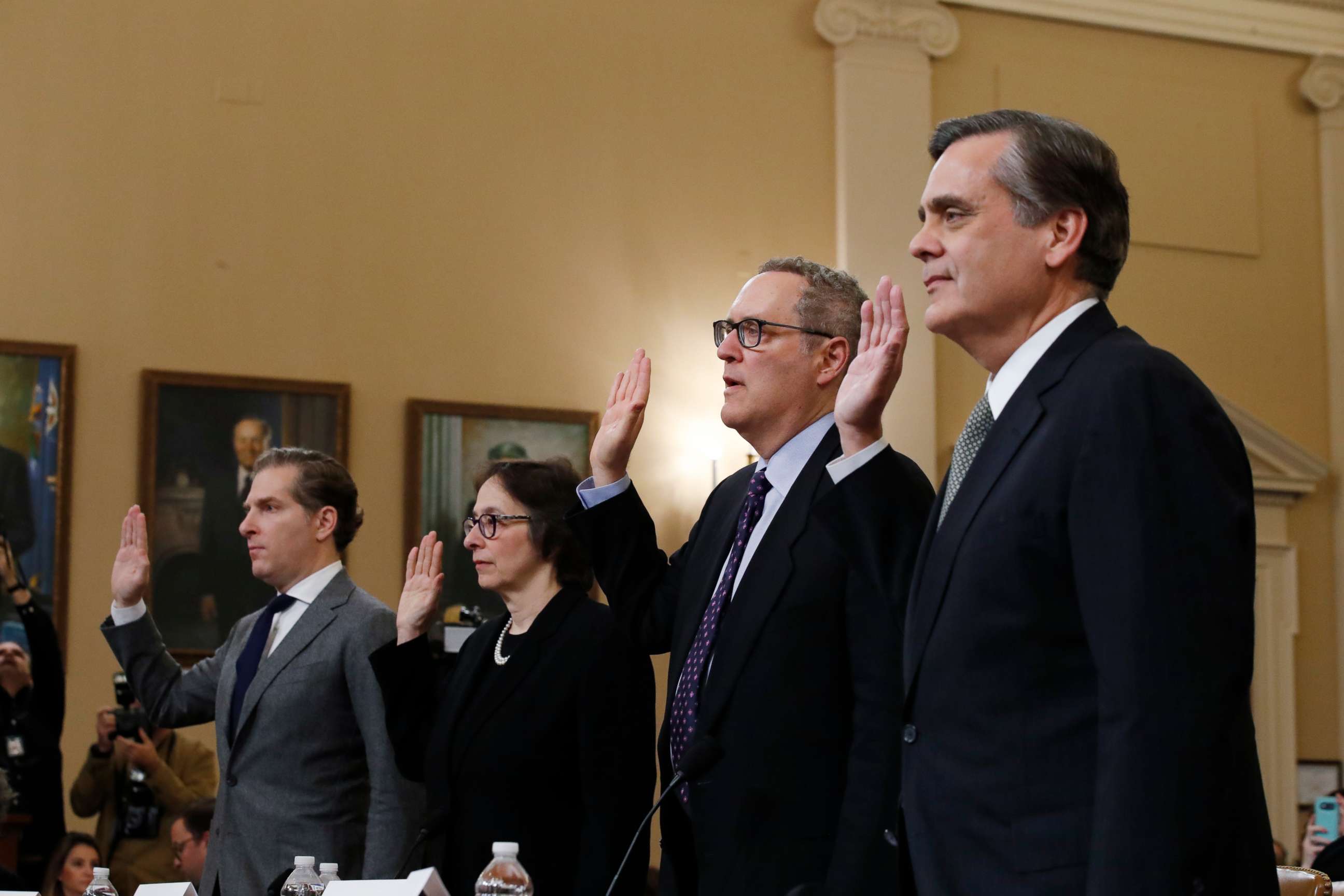
10: 20 a.m.
"What's not new is the facts," Ranking Members Doug Collins says in his opening statement. "It's the same sad story," he says.
He argues the Founders were concerned about political impeachment "because you just don't like the guy." he says.
"You know what's driving this? " Collins says. "Two things, it's called the clock and the calendar, the clock and the calendar, most people in life what they truly value you look at their checkbook and their calendar, you know what they value. That's what this committee values. Time. They want to do it before the end of the year. Why? Because the chairman said it a few seconds ago, because we're scared of the elections last year that we'll lose again. So we got to do this now. The clock and the calendar are what's driving impeachment. Not the facts,"
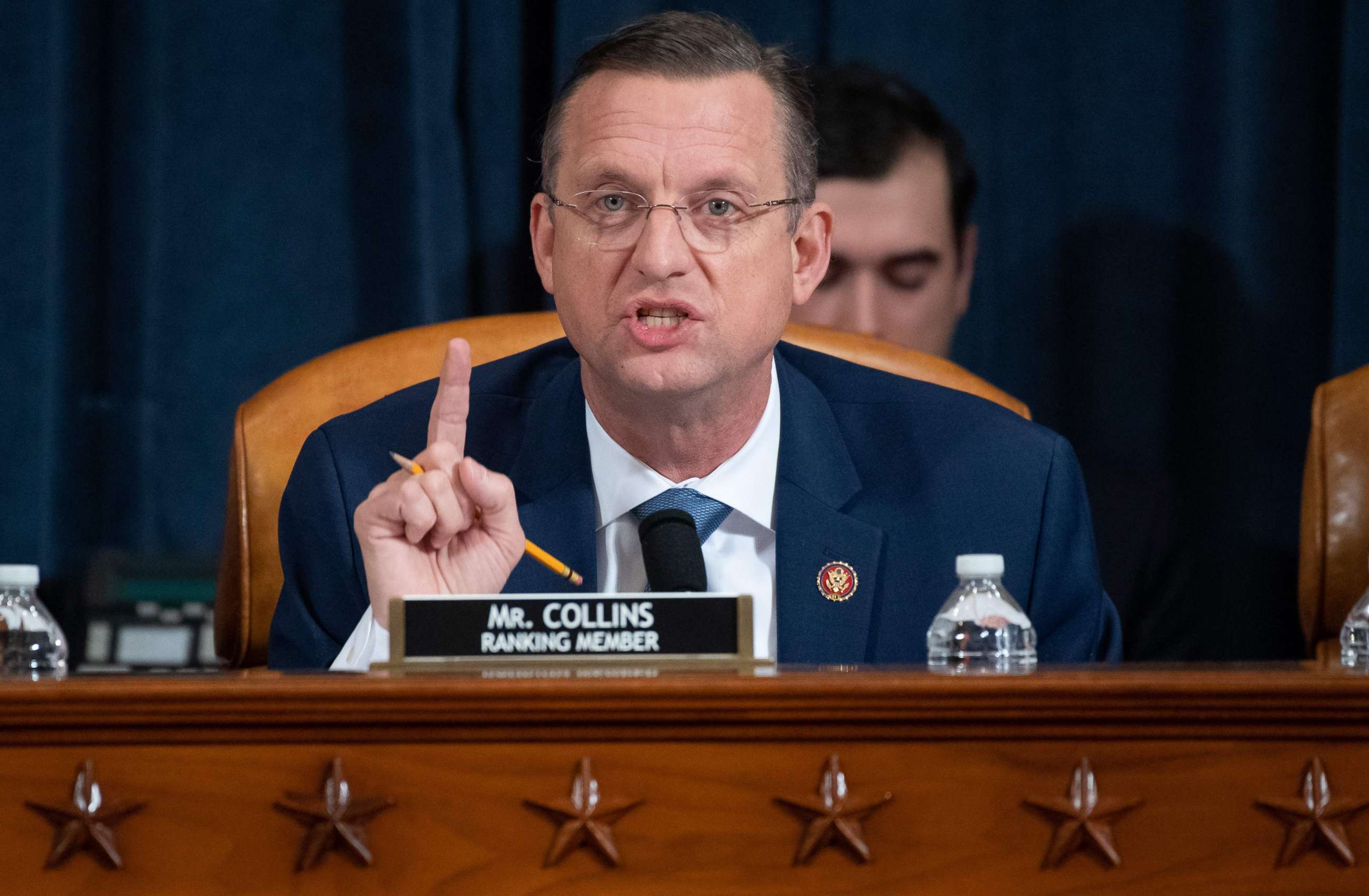
"This is not an impeachment. This is just a simple railroad job, and today's [hearing] is a waste of time," Collins continues.
"It didn't start with Mueller, it didn't' start with a phone call ... it started with tears in Brooklyn in November 2016," he says.
10:06 a.m.
Chairman Jerry Nadler gavels the hearing open.
"The facts before are us are undisputed," the New York Democrat says, adding that President Trump has attacked witnesses who've testified previously.
"He did everything in his power to prevent the American people from learning about his conduct," he said.
Nadler stressed the Founders' concerns about foreign interference in elections and the president's lack of cooperation with congressional investigations.
"Never before has a president engaged in a course of conduct that included all of the acts that most concerned the Framers. The patriots who founded our country were not fearful men. They fought a war. They witnessed terrible violence. They overthrew a king. But as they met to frame our Constitution, those patriots still feared one threat above all---foreign interference in our elections," Nadler said in his opening statement.
"The storm in in which we find ourselves today was set in motion by President Trump," Nadler said in his opening statement.
"The president has shown us his pattern of conduct. If we do not act to hold him in check now, President Trump will almost certainly try again, to solicit interference in the election for his personal political gain," he added.
9:58 a.m.
Members and witnesses are starting to take their seats in the hearing room.
President Donald Trump has cancelled his conference in London scheduled for 10:30 a.m. Washington time, shortly after the hearing was supposed to get underway.
A GOP member of the Judiciary Committee and vocal critic of the impeachment inquiry, Rep. Matt Gaetz. told ABC News Senior Washington Reporter on ABC News Live that Republicans will continue to push to call their own witnesses to defend Trump, but said he sees the result of the House impeachment inquiry as a “foregone conclusion.”
As for Wednesday’s hearing, Gaetz said Republicans don’t have anything to prove and that Democrats think the testimony from “liberal law professors” will support their conclusions.“Today will largely be legal analysis that I think will bore the country to death,” he said.
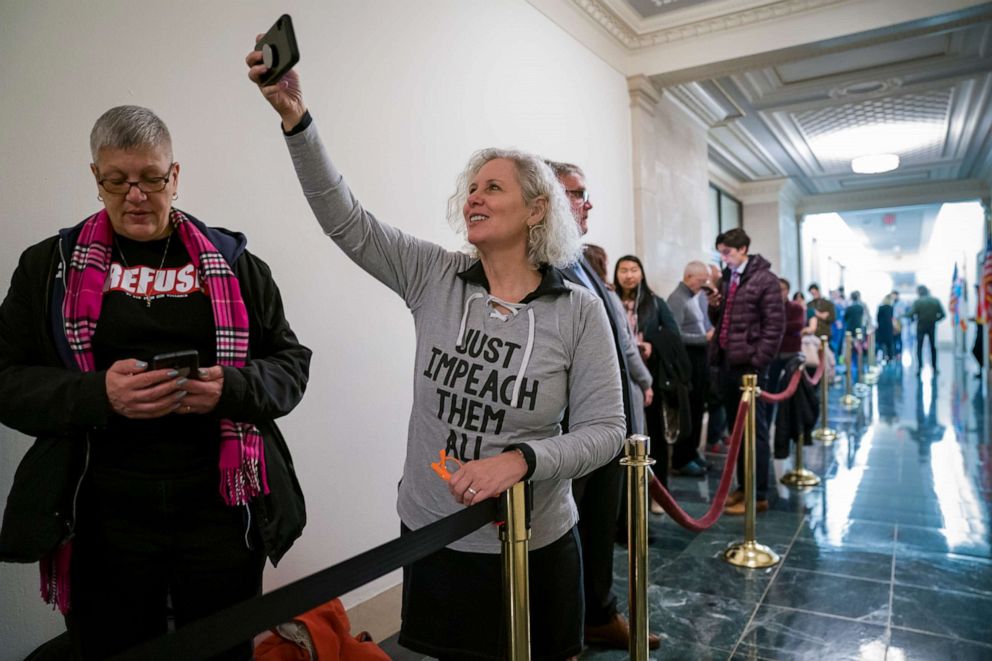
9:35 a.m.
Three witnesses have been called by Democrats: Noah Feldman of Harvard Law School, Pamela Karlan of Stanford Law School, and Michael Gerhardt of the University of North Carolina School of Law.
Testifying for Republicans will be Jonathan Turley of The George Washington University Law School.
Their opening statements have been made public.
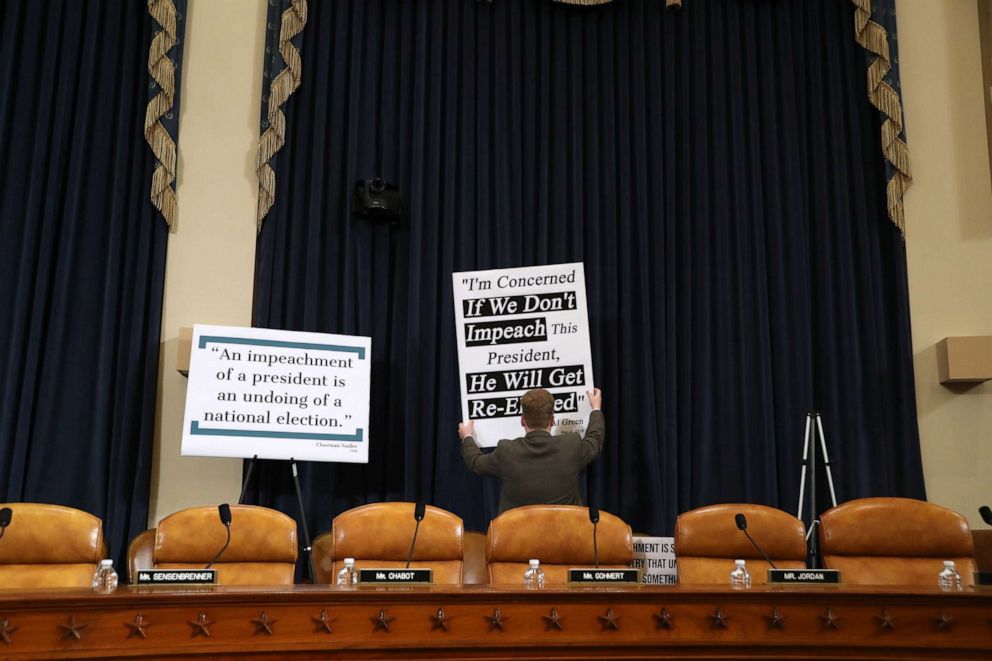
Feldman says his analysis is that President Trump’s actions fit the constitutional definition of “high crimes and misdemeanors.”
“On the basis of the testimony and evidence before the House, President Trump has committed impeachable high crimes and misdemeanors by corruptly abusing the office of the presidency,” Feldman said in his prepared remarks, specifically citing his request for Ukrainian President Voldymyr Zelenskiy to announce investigations into the Bidens and the 2016 election.
Feldman said the idea of impeachment is critical to the basis of American democracy, specifically the idea that unlike a king, the president is not above the law and there should be checks on a president.
“The framers believed that elections were not a sufficient check on the possibility of a president who abused his power by acting in a corrupt way. They were especially worried that a president might use the power of his office to influence the electoral process in his own favor. They concluded that the Constitution must provide for the impeachment of the president to assure that no one would be above the law,” he said.
Gerhardt compared Trump’s behavior to former President Richard Nixon, who famously resigned as Congress was considering whether to impeach him.
He says the president’s actions correspond which each of the three articles of impeachment against Nixon - obstruction of justice, abuse of power, and failure to comply with legislative subpoenas.“The president’s serious misconduct, including bribery, soliciting a personal favor from a foreign leader in exchange for his exercise of power, and obstructing justice and Congress are worse than the misconduct of any prior president, including what previous presidents who faced impeachment have done or been accused of doing,” he said in his opening statement, adding that even Nixon cooperated with congressional investigations.
Karlan speaks of the constitutional threshold.
"The list of impeachable offenses the Framers included in the Constitution shows that the essence of an impeachable offense is a president's decision to sacrifice the national interest for his own private ends. “Treason” lay in an individual’s giving aid to foreign enemies—that is, putting a foreign adversary’s interests above the United States’. “Bribery” occurred when an official solicited, received, or offered a personal favor or benefit to influence official action—that is, putting his private welfare above the national interest. And “high Crimes and Misdemeanors” captured the other ways in which a high official might, as Justice Joseph Story explained, “disregard . . . public interests, in the discharge of the duties of political office,” she says in her prepared remarks.
